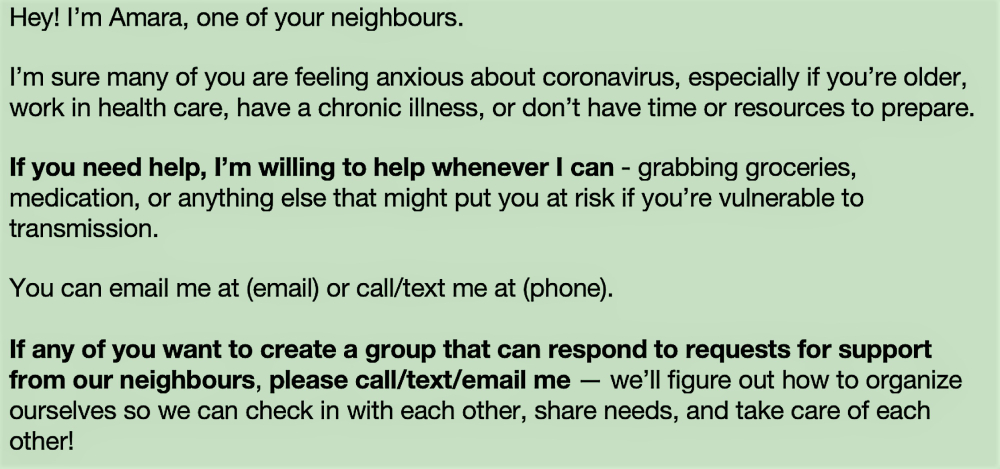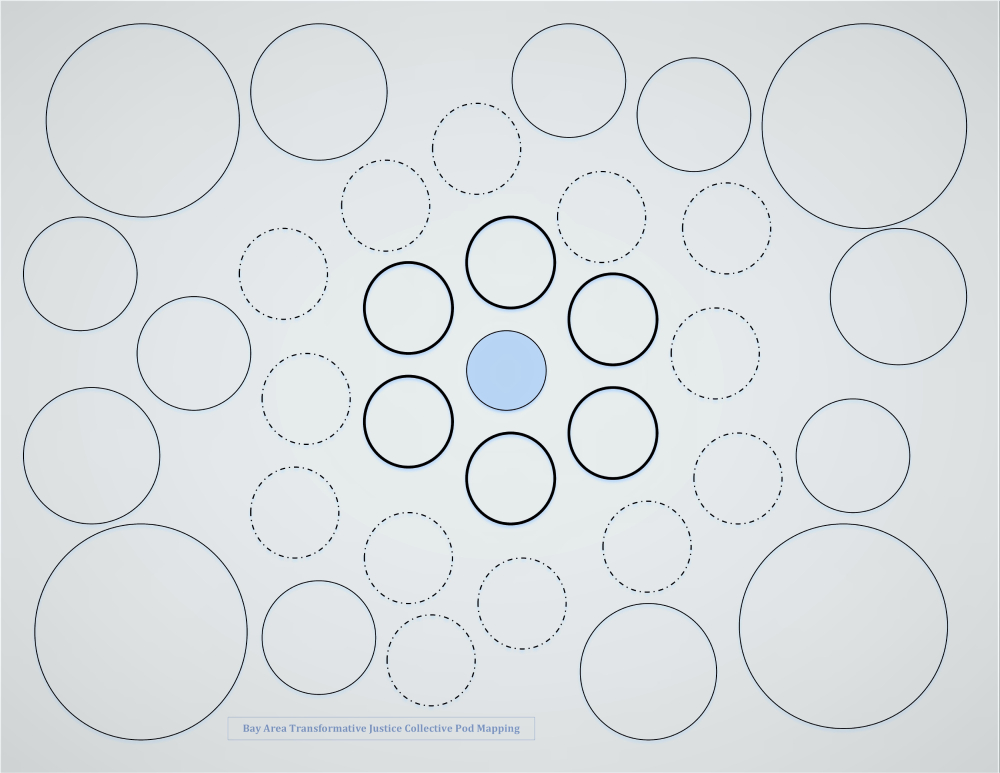When I reach Amara Possian over the phone, the first thing she tells me is that her hands smell like garlic. She’s already made a lentil soup and a wild rice and mushroom soup.
“All the delicious soups I like to eat when I’m sick,” she says.
Possian isn’t stockpiling for herself though. She is cooking for her neighbours and family members.
Since COVID-19 arrived in Canada people have been wildly buying toilet paper, Lysol wipes and canned food. Some have even been turning a profit by buying large quantities and reselling them for premium prices.
However a growing number of people like Possian have instead been thinking about how to form networks of care and support. Facebook groups like CareMongering-TO, We got this —Winnipeg and COVID-19 Coming Together (Vancouver) are providing a space for people to ask for and offer help.
New members are joining every day — the Vancouver group now has more than 20,000 members.
People offer to translate, run errands, call people living in isolation and share information such as tips on which stores still have ample supplies. People can also post their requests for help. Someone who was self-isolating asked if anyone could drop off some oranges and chamomile tea so she didn’t have to go to the store and risk making others sick. A sick mom who had a sick baby connected with someone who dropped off baby Tylenol at her place. A person living in a collective house asked what others in similar housing were doing to reduce the risk of transmission.
Avery Shannon, one of the moderators, said the Vancouver group started as an attempt to build a different narrative from the racist, fear-mongering one playing out in the popular imagination. The group wants to encourage physical separation rather than social isolation.
“We need to be connected now more than ever, just in different ways.”

Possian says the existence of the online groups helped motivate her to start reaching out in person. On Friday she passed out notes to 30 of her Toronto neighbours, inviting them to reach out for help if they needed it, particularly those who more vulnerable to contracting the virus. Keeping those folks out of stores, of course, is safer for everyone.
Jason Kindrachuk, assistant professor and Canada Research Chair in emerging viruses at the University of Manitoba, said he likes this idea — as long as people take necessary precautions.
“The trouble with this virus is that there’s a high percentage of the population that shows really mild symptoms or even none at all,” he said. So even if people reaching out to help their neighbours feel healthy, they should make sure their hands are washed, keep a distance of two metres or more and sneeze or cough into their arm or shoulder.
People receiving delivered groceries or medication should also take the necessary precautions and wipe off packaging with soap and water.
Possian’s efforts were based on the mutual aid “neighbourhood pod” networks she saw being developed in places like Boston. There, people are reaching out to their neighbours with notes, inviting them to WhatsApp group chats of between five and 30 people where they can stay in touch, share resources and provide needed support.
You can build your own pod network through “pod mapping”. Originally developed by Mia Mingus for the Bay Area Transformative Justice Collective to deal with harm in communities, pod mapping can also be used to create support networks and build connections.
This can work well in the context of the pandemic as well, particularly for people at greater risk. Ask several people you trust if they’d like to be a part of your mutual aid pod and if so, what they can contribute. Who is still healthy? Who might be able to bring you groceries or medication if you aren’t able to leave the house? Who might be able to provide childcare if you have to go into work?
Of course, choose the right people carefully. Carolyn Cannuscio, the director of research at the Center for Public Health Initiatives at the University of Pennsylvania, recommends two households that are in strict agreement to reduce all outside can safely support each other. Kids can transmit the virus without showing symptoms. Offer to be in someone else's pod too if you’re up for it.*

Possian knows some people might feel overwhelmed by the challenge of helping people when it feels like there might be a lot of need, so she recommends starting small.
“I think I’d say just start with where you are and what feels possible for you. It doesn’t have to be perfect, it doesn’t have to be a massive act. It’s just about being there for each other.”
Checking in on neighbours during a crisis, particularly elderly ones, can be lifesaving. During the deadly Chicago heat wave of 1995, people living in social isolation were the most affected.
Eric Klinenberg, author of Heat Wave: A Social Autopsy of Disaster in Chicago, found that the heatwave exacerbated problems that already existed in the city.
“The death toll was the result of distinct dangers in Chicago’s social environment: an increased population of isolated seniors who live and die alone; the culture of fear that makes city dwellers reluctant to trust their neighbours, or sometimes, even leave their houses,” he said in an interview.
Possian knows these small efforts help but don’t address some people’s biggest issues right now. She’s heard back from a couple of neighbours who have thanked her for the gesture and shared their fears about childcare and wondering what they’re going to do about work.
“I can make soup and drop off groceries but me and my friends cannot provide guaranteed sick leave.”
Shannon says the Vancouver support group has seen the same gaps. They want to start incorporating advocacy on their page, like the work LeadNow is doing to call on the government to make sick leave available for everyone.
Ultimately these social safety nets benefit everyone. If people who were sick could stay home, the virus would spread much slower.
“I think people are really understanding that we’re all interconnected and how we’re all reliant on keeping each other safe and staying connected as a functioning system,” Shannon says. “We can see where it’s a bit broken in places. These are things we should already be doing in society, but this outbreak is really highlighting the need for.”
*Story updated on March 19 at 1 p.m. to note that children can transmit the coronavirus without showing symptoms and that individuals should be careful when offering support like childcare for others. ![]()
Read more: Health, Coronavirus
















Tyee Commenting Guidelines
Comments that violate guidelines risk being deleted, and violations may result in a temporary or permanent user ban. Maintain the spirit of good conversation to stay in the discussion.
*Please note The Tyee is not a forum for spreading misinformation about COVID-19, denying its existence or minimizing its risk to public health.
Do:
Do not: